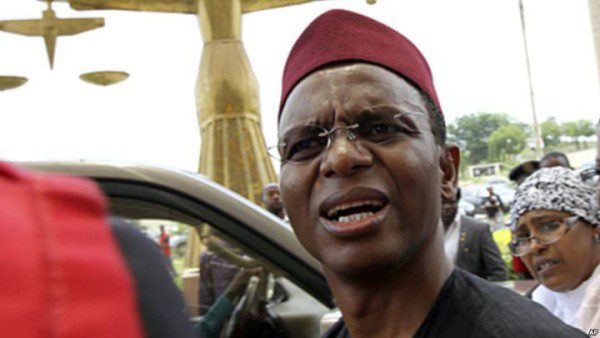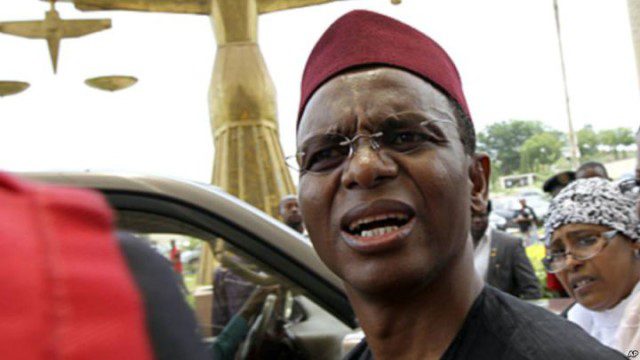National Issues
Southern Kaduna: Critical perspectives on national security -By Dr. Rufai


Mallam Nasir El-rufai, Kaduna State Governor
The other day, Nobel laureate, Prof. Wole Soyinka, erroneously characterised the Southern Kaduna crisis as religious in orientation and I got incredibly perturbed! Similarly, I was perturbed by the performance so far – in connection with the crisis- of the Governor of Kaduna State, Mallam Nasir el-Rufai. A scholar owes it a duty to his country, state or community, to subject to an illuminating light any deliberately distorted, whimsically manipulated or inaccurately articulated facts or figures of national interest especially where the inaccuracies involved have the potential to set a relatively peaceful geopolitical entity on conflagrations. I hasten to state that the duo rank high in my estimation that their names feature prominently on the list of my champions! I blissfully identify myself as a full-time fan of the pride of the African continent, Soyinka! As regards el-Rufai, I publicly underscored to him face to face, while moderating a national discourse where he was Guest Speaker at the University of Lagos Auditorium in 2014, the need for him to return to the academic world where, I reckoned, he truly belongs owing to his impressive academic record.
The public woke up on Friday, January 13, 2017 assailed with both local and foreign media reports on Prof. Soyinka’s proposal of the taming of religion to prevent it from killing Nigeria. “If we don’t tame religion, it’ll kill Nigeria”, the revered laureate was widely reported to have stated. He advanced a lengthy justification for the destructive nature of religion which may not be of direct relevance to this discourse. What concerns the present article however is his statement that, “In this very nation, in Southern Kaduna, 800 souls were brutally extinguished suddenly while the issue of grazing land versus farming is unquestionably part of the conflict. It is equally undeniable that religious differences have played a crucial role in the conflict”. Soyinka added that the Kaduna State governor…admitted sending funds to those who were responsible for the killing, saying “What astonished me was not the admission by the governor but the astonishment of others at such governmental response to atrocity. There was nothing new about it. Has appeasement to religious forces not become a Nigerian face of justice and equity; first lethargy and then appeasement? Wasn’t Boko Haram’s Muhammed Yusuf a beneficiary of appeasement in a similar fashion?”
The crisis which Soyinka defined as “religious” and likened to Boko Haramism has been put in a different perspective by The PUNCH editorial of Thursday, January 26, 2017 in the following words: “Fulani herdsmen, enslaved to centuries-old nomadic pastoralism and confronted with desertification in the upper parts of the Sahel and Savannah, moved southwards to other parts of the country to graze their livestock. The problem is that the owners of the land are farmers, settled in villages and towns in the North-Central and Southern regions. Cattle, goats and sheep destroy crops and farmland. Since the Fulani bizarrely believe that all land is theirs, clashes inevitably occur”…According to the National Emergency Management Agency, 204 persons have died in recent violence in Southern Kaduna, which is populated by minority ethnic nationalities…” Threats of retaliation rent the air and voices ominously urging the faithful to “defend themselves” are issuing forth from the Christian community once remarkable for preaching “turning the other cheek.” Rival threats and narratives also come from Fulani and Northern groups that belie the occasional calls for peace from those camps.” It should be noted that the accuracy of this perspective has been put to question in a number of interventions on the crisis chief among them being the piece entitled, “Understanding the Southern Kaduna Crisis” (Thisday, January 4, 2017) by Uba Sani who is the Political Adviser to the Governor of Kaduna State. The heart of Sani’s argument was expectedly that his principal was quoted out of context concerning his alleged compensation of the herdsmen. I venture to engage critically here with the implications of the perspective and counter-perspective, drawing on the growing but sophisticated scholarship of ethnic and security studies.
Any uncritical reading of religious terrorism into communal clashes and ethnic violence may further heighten tension and should therefore be systematically corrected without delay, in the interest of national security, without necessarily distorting any salient fact or suppressing a bitter truth. Will it be rational to characterise the Palestinian/Israeli conflict which was unarguably politically motivated, as religious in nature all because the Palestinians are pre-dominantly Muslim and the Israelis, preponderantly Jews? Will it also be accurate to associate with religion the attacks and counterattacks that were recorded in the numerous attempts by insurgents to rebel against Great Britain during the breakdown of colonial rule, as the modern state of Israel was being negotiated? Palestinian Zionists, the Yishuv, launched a decisive insurgency in the late 1940s which led to the bombing of buildings, and paved the way for bloody conflicts as violence erupted incessantly before the imposition of martial law by the British in Tel Aviv. Will it be correct to associate such clashes with “religious forces”?
It may also be pertinent to illustrate with the experience of Native American ethnic communities in North America during the American Indian Wars. Munroe and Mugaddam describe the wars which lasted from 1865 and 1891 as a slow process of minor battles between westward moving Whites (predominantly American citizens of European descent) and Native American Indians defending their territory.
To be continued
Dr. Rufai, a security studies expert, is the Ag. Dean, Faculty of Education, Sokoto State University.



















